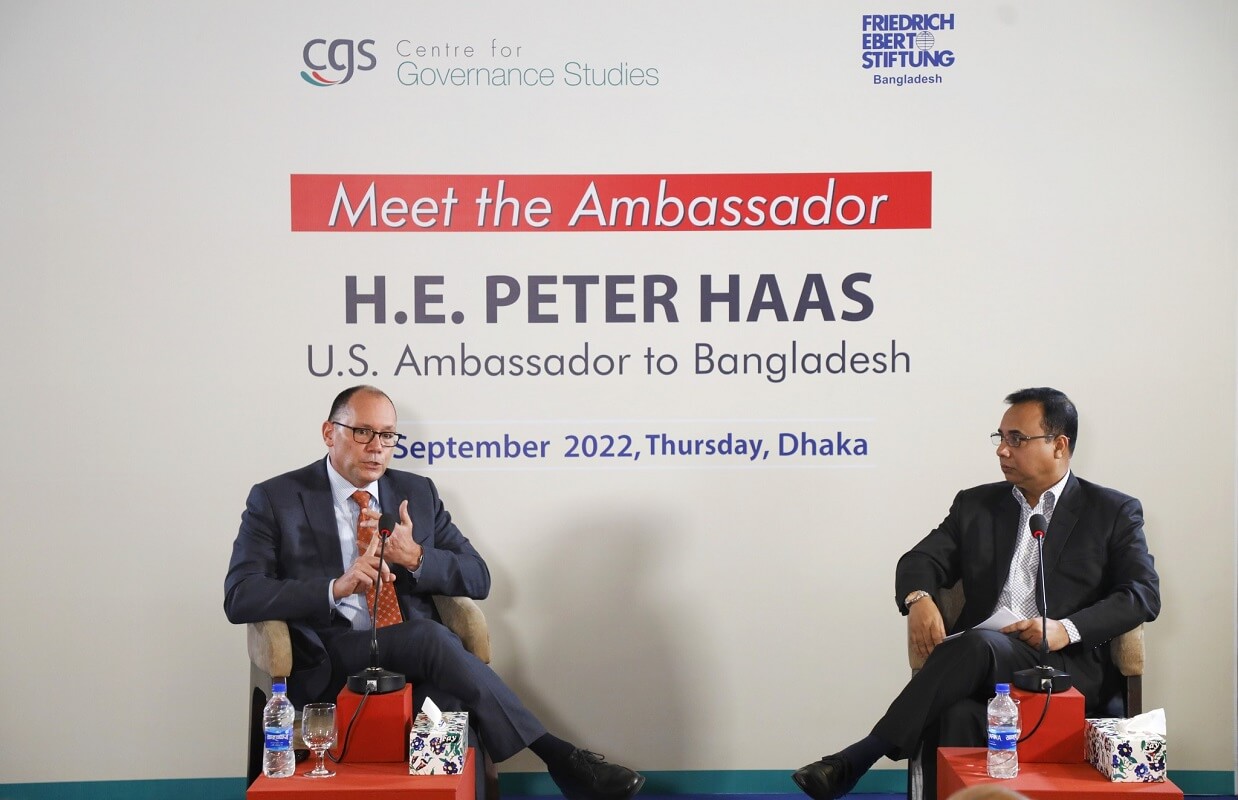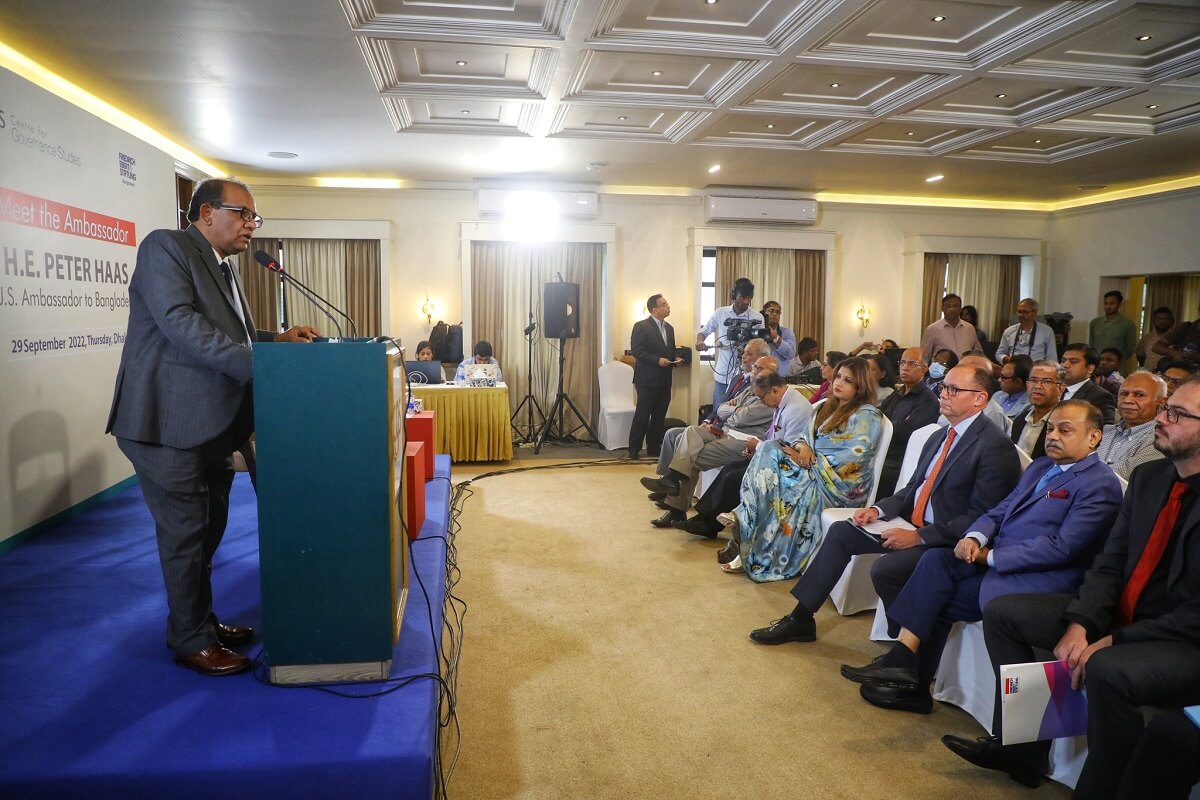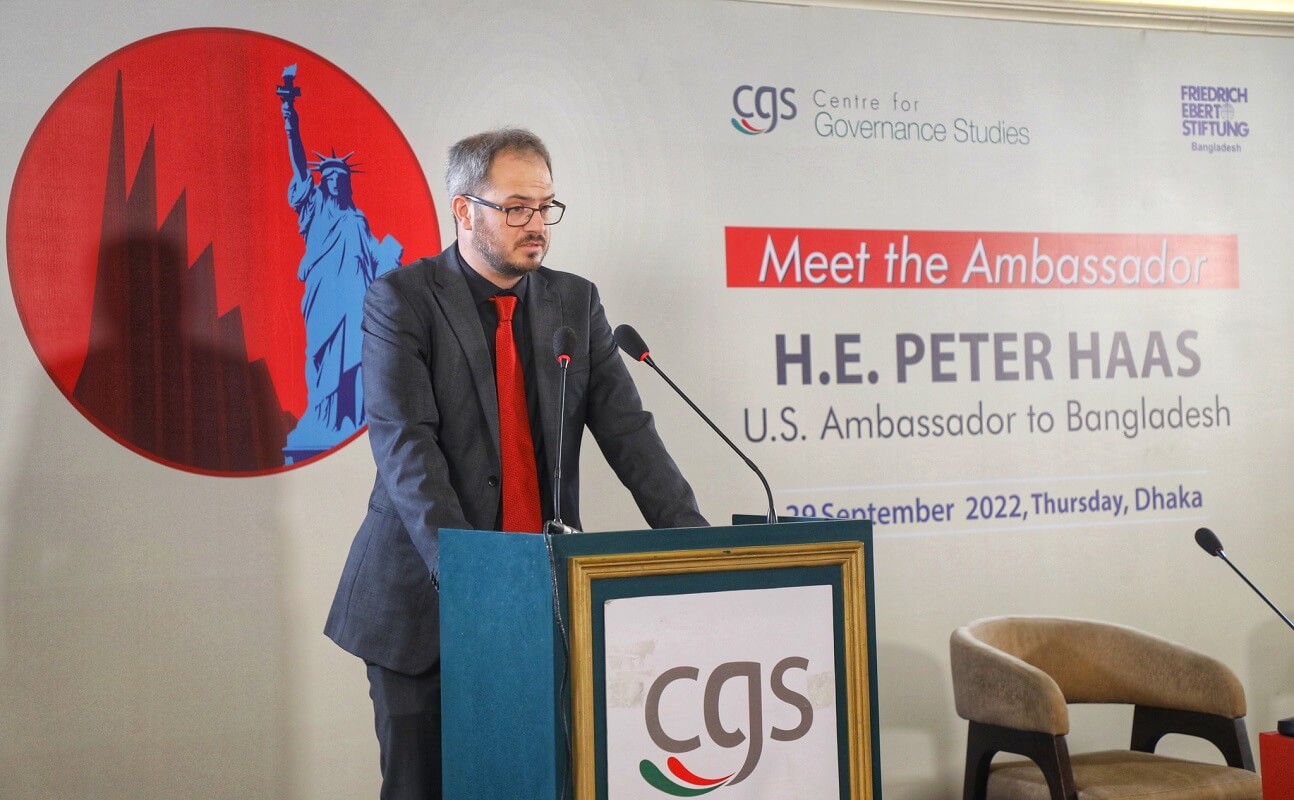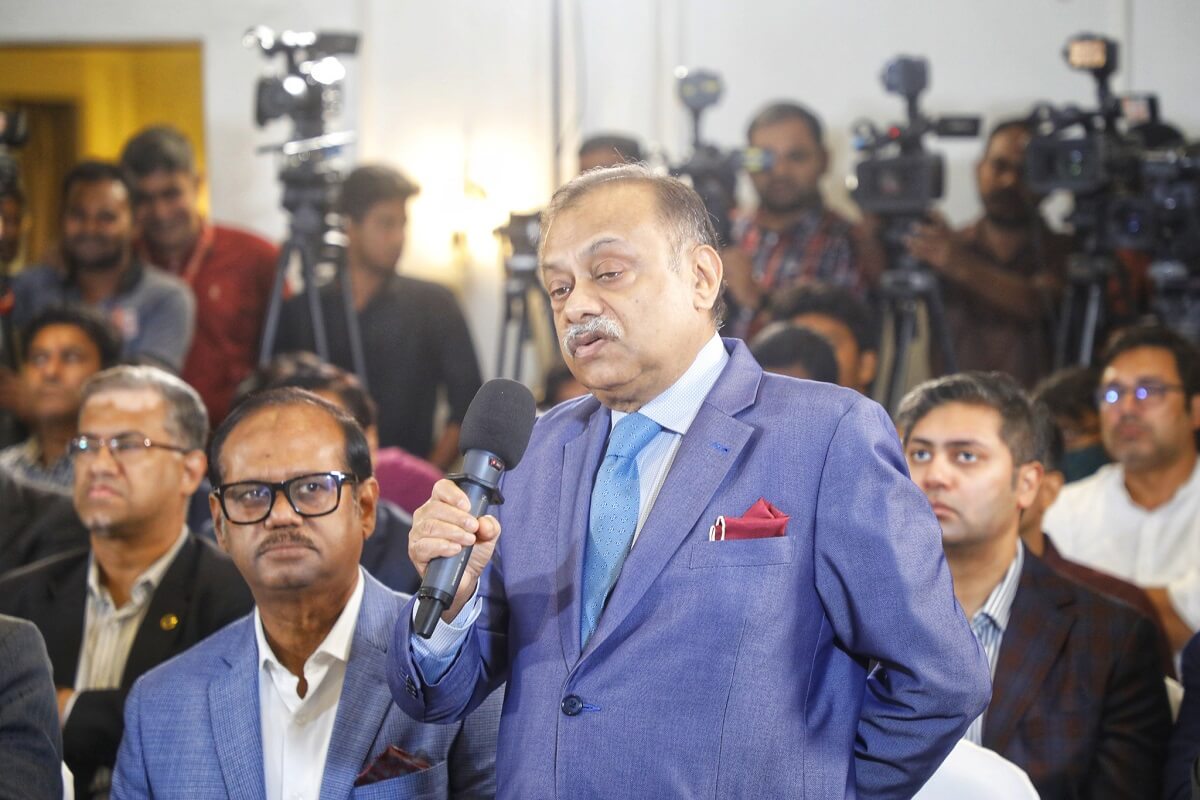Report on the Event of “Meet the Ambassador: U.S. Ambassador"
24 October 2022
On Thursday, 29 September, the Centre for Governance Studies (CGS) hosted a program in collaboration with Friedrich-Ebert-Stiftung (FES) Bangladesh titled “Meet the Ambassador”. The event took place in a hotel in Dhaka and was the latest edition of a series of “Meet the Ambassador” programs where ambassadors from various nations and international organizations are invited to talk to the members of Bangladesh’s civil society, academics, researchers, entrepreneurs, journalists, diplomats, and politicians from both ruling and opposition parties. H. E. Peter Haas, the U.S. Ambassador to Bangladesh was the key speaker at the event, where he gave a keynote speech and then answered questions regarding relations between the U.S. and Bangladesh.
The discussion was kicked off with an opening speech from Dr Manjur A. Chowdhury, Chairman of CGS and Chairman of the National River Protection Commission, , followed by an address by Mr Felix Kolbitz, Resident Representative of FES Bangladesh. The Executive Director of CGS, Zillur Rahman, moderated the conversation.

Manjur A Chowdhury welcomed everyone on behalf of CGS. He asserted that Bangladesh-US shared a deep, strong and multifaceted, yet a complex relation. Almost more than five decades ago, when Bangladesh was fighting against an occupation army, the policy of the US government was not exactly in our favor. Nevertheless, the people of the United States supported this country with open heart. He emphasized on one of the most important actions to stop the ongoing genocide here in Dhaka in Bangladesh which was the actions taken by a group of brave diplomats stationed at the U.S. consulate. The U.S. withheld their decision to recognize Bangladesh until all the Indian troops left this country. Last but not the least he mentioned the contribution of Ambassador Archer Kent Blood to stop the genocide, which will always be remembered by the people of Bangladesh. He concluded his speech by mentioning that the paradox of U.S.-Bangladesh relationship exists even today.

Mr Felix Kolbitz, in his speech, talked about the nature of the work of the FES Bangladesh. He asserted that the U.S. and Bangladesh have been working together for a long time and share common goals. The Indo Pacific region is becoming more important geopolitically for its geostrategic, naval, and geo economic standing and prospects. Bangladesh and the U.S. celebrated the 50th anniversary of their diplomatic relations earlier this year. He stated that both the countries must evaluate the equality of the bilateral relationship and explore possible future relations. He believed this event would lead to more constructive relations between the U.S. and Bangladesh.
In his keynote speech, Peter Haas gave a brief overview of the relations between Bangladesh and the U.S. He talked about five specific objectives of his office in Bangladesh. Bangladesh is the largest country in terms of having development assistance from the U.S. in Asia. According to the ambassador, the main goal of the U.S. is to see a peaceful and stable Bangladesh. To achieve this goal, the U.S. follows five key objectives in Bangladesh. The first goal is to strengthen U.S. military ties with Bangladesh. The second goal is to advocate for Democracy, Transparency, Pluralism, Tolerance, Good Governance and respect for Human Rights. He said the U.S. wants to see a free and fair election in Bangladesh in accordance with the international standards where every political party can participate without hindrance. To do this, he suggested every stakeholder respect the rule of law. The third objective is to help Bangladesh become socially and environmentally resilient. To do this, the U.S. prioritizes collaborating with the Bangladesh private sector. The fourth objective is to support Bangladesh in achieving sustainable and broadly shared prosperity. He appreciated the efforts of Prime Minister Sheikh Hasina to invite U.S. business people to invest more in Bangladesh. Lastly, he discussed the fifth objective to support Bangladesh in hosting the Rohingya refugees until they can be safely repatriated. He appreciated the generosity of Bangladesh in supporting the Rohingya refugees. He also said the U.S. would remain the largest supporter of Bangladesh to help the refugees. He concluded his speech by saying that every objective he discussed is important, and the U.S. is working hard to achieve these goals every day.
During the following conversation with moderator Zillur Rahman, the ambassador expressed his delight regarding the 50th anniversary of diplomatic ties between the U.S. and Bangladesh. He hopes Bangladesh-U.S. relations will grow significantly in the coming years.
Regarding ease of doing business, He emphasized that there is a tremendous opportunity to diversify export and import. Bangladesh needs to create an atmosphere where U.S. businessmen could be comfortable investing.
According to the ambassador, the U.S. is collaborating with Bangladesh to address climate vulnerabilities similar to what was discussed at the COP events. The U.S. will help Bangladesh by initiating climate adaptation and mitigation projects.
While talking about education, he said Bangladesh is one of the leading countries in terms of sending students to the U.S. for higher studies. The ambassador outlined the various scholarship opportunities the U.S. provides students of Bangladesh.
Regarding the Indo-Pacific Economic Framework, His Excellency mentioned some key challenges. He also stated that negotiations are underway with the government of Bangladesh to allow them to join the U.S.-led Indo-Pacific Economic Framework.
The ambassador said there has been no change in U.S. policy on Taiwan. They will continue to search for a stable, safe Taiwan Strait. He also referred to the visit of Nancy Pelosi and the Speaker to Taiwan. This is perfectly consistent with the way we have treated Taiwan over the past few decades. Thus, he also claimed that their strategy and approach remained unchanged. What has changed is Beijing's response. So, they still want to make the Taiwan Strait safe and stable. They stand by their current policy, and they don't want the situation to get worse.
When asked about the Rohingya refugee crisis, he said the Myanmar army is responsible for the genocide and refugee problem. And it requires an integrated international strategy and response. He also hoped that the U.S. would play a leadership role in this regard. At the United Nations, they imposed sanctions on Hanta leaders and encouraged ASEAN countries to come forward and apply pressure. The ambassador also acknowledged that what has happened is genocide because the actions that have been taken at one stage have to be held accountable. He also claimed that they are doing their best to encourage international pressure on Burma so that they can bring about a change on the ground. And he also stressed that they take the next step and understand the ability to make a living so that the Rohingya people can do things that they can do and acquire skills that they can develop when they return to Burma.
Regarding the resettlement, the ambassador said they have been working to significantly reduce the risk of settlement of Rohingya refugees in the region, including Bangladesh. So that they can rebuild their lives in the United States. President Biden announced this week that the United States would welcome 125,000 refugees and asylum seekers by next year. Currently, 10 Million people are forcibly displaced around the world, including more than 45 million in Asia. So, to put it in context, 125,000 are extremely important from their contacts but very small compared to the whole world. In this regard, they are working with UNHCR on how to rehabilitate. They have resettled around 10,000 Rohingyas in the last few decades and this is mainly from Malaysia and Thailand. But it's something that they see as part of the overall approach to dealing with the crisis.
He said they are involved with the Bangladesh government on the GSP issue. In June, they held high-level economic meetings and will hold another meeting in October to address labor concerns. He appreciated Bangladesh's achievements in workplace safety and exports since 2013. He said Bangladesh has to progress through collective bargaining. This is an important issue for the United States for workers' rights, unionization, and collective bargaining. Bangladesh is considering its EU trade linkages when it acquires the LDC classification. Bangladesh has three plus five plus one agreements with the US, EU, ILO and other countries.
He said the United States is concerned about the human rights situation in Bangladesh, as evidenced in its annual human rights report. They have had these concerns in Bangladesh for a long time and they have emphasized these issues. They see calls from the United Nations and others for an independent investigation. These are really a matter of concern for them, especially in the light of the upcoming national elections, to ensure that the people of Bangladesh have the power to elect their leaders.
In light of the upcoming elections, he stressed on the need for observers from other countries to be present. It needs to be ensured that the rule of law is being followed and individuals have the power to speak out against any unlawful activity. Along with this, he stressed on the need to follow and put in place various pre-election protocols.
The final session of the program was dedicated to the audience’s question and answer session. Some notable interactions were as follows: co-sponsoring a side event specifically on the situation of Burma and the Rohingya.

Regarding the One China policy and the rule-based order with Taiwan, the ambassador has positively accepted this fact. He also said that the U.S. has never seen Bangladesh through India. In his view, Bangladesh is the eighth most populous country in the world. One of the fastest growing economies out there is one that has an important strategic position and a very important region.
The ambassador said the United States is ready to work with Bangladesh to transition from a more sustainable state of emergency. In support of this, he said, the U.S. has sought an additional $170 million to support the Rohingya refugees and the Host Community of Bangladesh. He also noted that they have also focused on the Government of Bangladesh and the international donor community to provide better access to education, better livelihood opportunities and greater security to the refugees
Relating to energy and climate change challenges the ambassador certainly believed that the Russian invasion of Ukraine had slowed down the transition to clean energy and forced people to reconsider some previously abandoned energy sources, such as coal-fired power plants or nuclear energy. The purpose is solely to meet the challenges of the present energy demand and determine the time required for switching to alternative energy sources. It is crucial that this transitory aspect be present.
Therefore, depending on more harmful materials in the near future is one thing. That part of it needing to be transitional is critical. So it's one thing to rely on more polluting materials for the short term. In order to deal with the crisis, the focus continues to have to be on how people use clean energy in the future. I totally get the need to supply people and industries today, but not to make the mistake of building entire physical plants using old technologies that will last 30 or 40 years at this point. It's also something that is causing all governments to re-evaluate their entire energy programs, whether they've been exploring enough, whether they've been bringing enough energy, whether they've been encouraging the exploitation of the resources that they have.
As the Ambassador addressed, the U.S. expects a gender-diverse audience to participate in the upcoming election. They also highlight the need to empower women and create a more varied society.
With reference to the Burmese sanctions the Ambassador mentioned, lots of sanctions on Burmese military leaders has been placed and will carry on to impose sanctions. He also said, U.S. will continue to pursue them for corruption and for human rights abuses.
On his response to question about Generalized System of Preferences (GSP), the Ambassador alleged, U.S. GSP never provided duty free benefits to the garment industry. They've always been excluded from GSP. According to him, there is a problem with GSP and these privileges have been withdrawn because of concerns over labor rights. He also affirmed, there's been progress here in Bangladesh on labor rights but there are still some concerns and providing financing under the development finance corporation as it is a far more important tool. Many American businesses would be eager to invest in Bangladesh under the Development Finance Corporation in crucial fields including clean energy, wastewater treatment, and new technologies, he said.
The U.S. envoy stated the summit for democracy last year, those who participated, including the United States, there was a call to action and for countries to develop plans on where they wanted to work with the recognition that democracy is always a struggle to continue to improve, to continue to evaluate. He said, conversations with the government of Bangladesh took place about the possibility of having a call to action and a pledge on what they were committing to do.
On regards to the barriers that affect U.S. investment to Bangladesh, he vocalized on the importance of Bangladesh benchmarking itself against its competitors as it seeks to attract foreign direct investment. As foreign investors look for most secure market, where they're certain they can repatriate capital, where the logistics are best.
Furthermore, he suggested the Indo-Pacific Strategy is free, fair, open, resilient, and prosperous, where every country is free to make its own decisions without coercion and Bangladesh should be focused on meeting the standards in order to achieve these principles.
On the topic of sanctions for RAB, the ambassador confirmed there has been no change in the US and the sanction will remain in place until there is both accountability and reform. He proclaimed sanctions are not intended to punish anyone, they are intended to change behaviour and acknowledged remarkable decline in reported abuses being conduct by the Rapid Action Battalion since sanctions were imposed last year.
On the question of inclusive and transparent election, his answer was its everyone's responsibility for elections in accordance with international standards. On his opinion to 2014 and 2018 elections he said, this is a uniquely American thing where we to focus on today and what's going forward and rather less about what happened in the past. To the Ambassador, one of the critical issues is to see if there is going to free, fair, transparent elections.
Moreover, the U.S. diplomat to Bangladesh gave his remarks to different issues such as U.S. continues to be one of the strongest advocate for women's economic and political empowerment around the world and focus very much on improving the ability of women to be equal participant’s society and how U.S. also has a big challenge of how to take care of an increasingly aging population. He further concluded U.S. will continue to invest and cooperate to build capacity going forward by providing trainings so that they are ever more professional in the way that they do their work.
At the engaging question and answer session were notable guests such as, Lt General Aminur Karim, former State Minister of Foreign Ministry Abul Hasan Chowdhury, Major General (Rtd) Ibrahim, Former Ambassador Humayan Kabir, Professor Ijaz Hossain, Former Ambassador Nasim Ferdous, Former Ambassador Shafiullah, BNP’s Central Working Committee Member Shama Obaid, Barrister Sarwar, and Shamim Haider Patwary, MP; and many other members of academia and the media who brought forth pertinent questions for the ambassador to answer.
